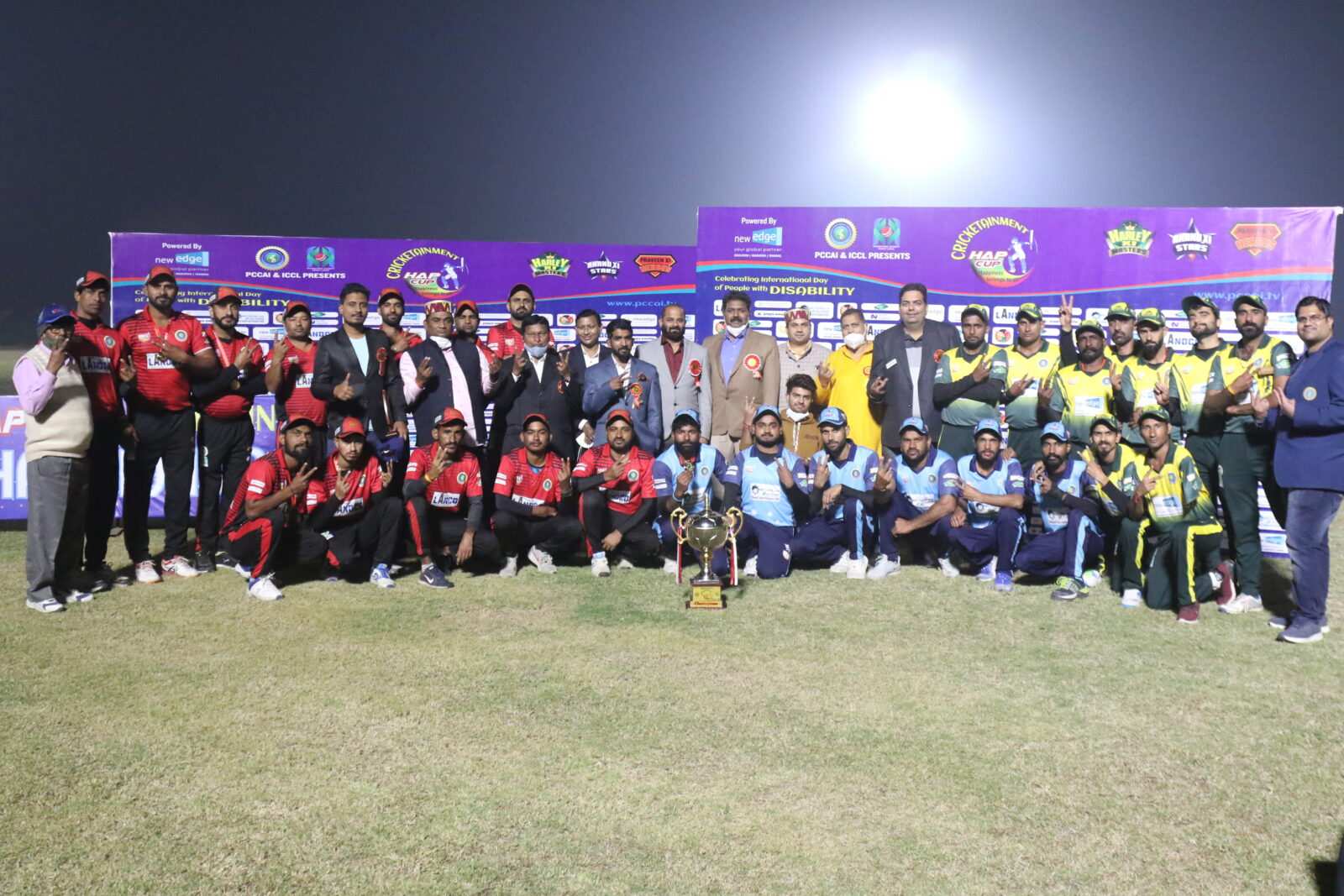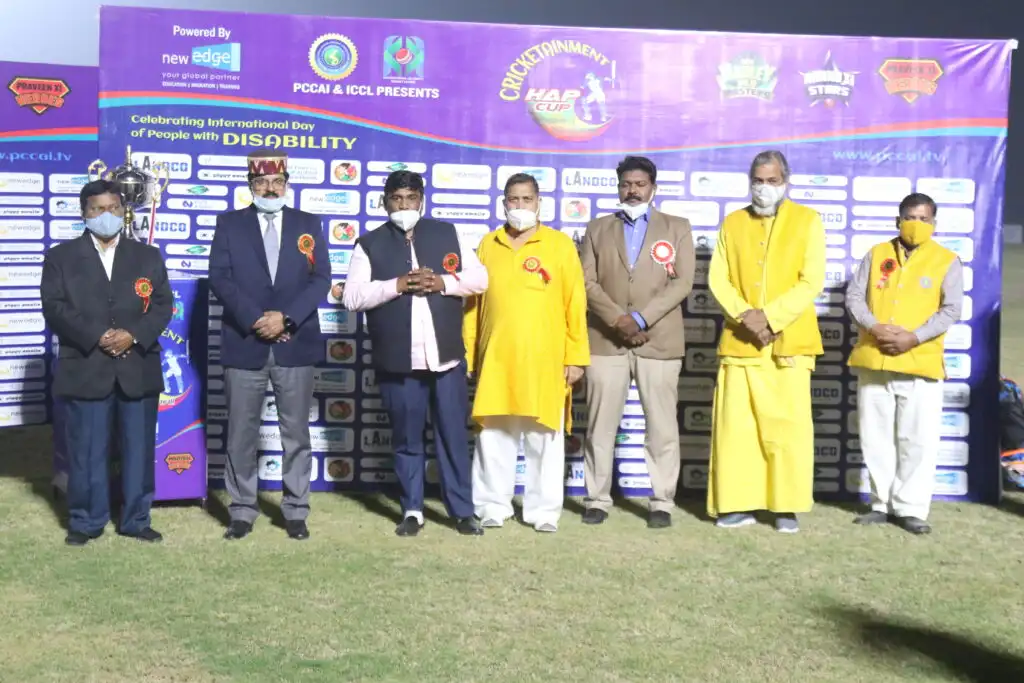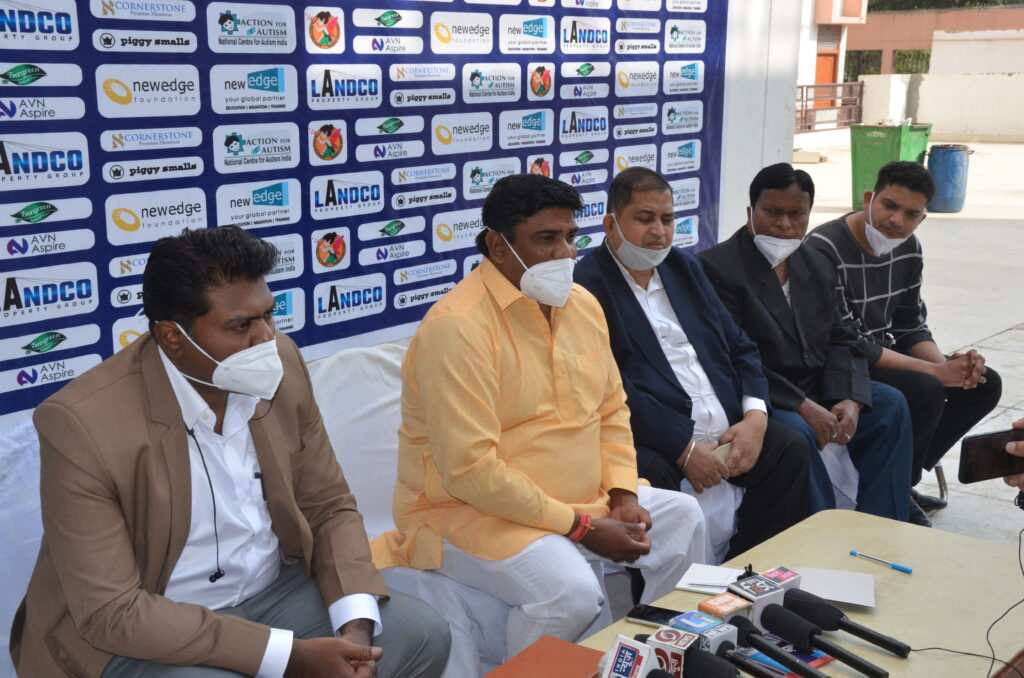The Winning Stroke

The physically challenged cricket team have fought their circumstances undaunted and proved themselves with deep passion for the sport. But recognition seems a far cry. Surela Chakraborty in conversation with Vice-President Mr. Sangeeth Silveri and Secretary-General Mr. Ravi Chauhan discovers how PCCAI is helping the disabled players to tide over these tough times and ensure victory belongs to them
The unforgettable victory of Team India under the captaincy of Vikrant Keni against England in the first ever Physical Disability World Cricket Series held in 2019 made the entire cricket fraternity in India sit up and take notice. Team India not only remained undefeated throughout the six-nation tournament including the warm up games but defeated the host England by 36 runs. What the players achieved in terms of batting, fielding and wicket mesmerised the top brass of many cricket associations in India and abroad. They were inspired to come forward and fight for the cause of the physically disabled cricket players who, for the lack of resources and awareness, were overshadowed. There was media fanfare and BCCI president Sourav Ganguly awarded the team.

Surprisingly, even after winning the first world series against England disabled cricketers were not getting recognition. Not many know about the Indian Physically challenged cricket team. Why this apathy towards disability cricket when the players are no less able, passionate and sincere than any other abled player? After all, the disability lies not in the person but the society’s perception of it. This holds true when it comes to recognizing the efforts of the disabled players who have clinched victory more than once.
Physically Challenged Cricket Association of India (PCCAI)is a Public charitable Trust registered in Faridabad. PCCAI was formed to encourage differently-abled players by organising competitions and tournaments at the block, district and state level to scout for talents. They encourage the physically challenged players by introducing them to regular cricket as a way to instill confidence in them. There are twenty-eight state associations and one thousand five hundred players affiliated to the PCCAI.
The goal is to “Spread the message of happiness and the benefits of an inclusive society while celebrating their special abilities.”
In order to realise this objective PCCAI has partnered with International Celebrity Cricket League (ICCL, Australia) to organise HAPCUP on December 3rd, 2020 to mark the International Day of Persons with Disabilities. HAP CUP did create ripples in the cricket fraternity. Mr Jaibir Singh Arya, Deputy Commissioner of Bhiwani, Haryana consented and graced the awards ceremony to bless and encourage the players. Mr Surender Lohia, President of PCCAI was also present during the ceremony and appreciated the true sportsman spirit of the players.

Performances of many differently abled yet talented players like Gurudas Raut, Gurjant Singh, Mandeep Singh Sran, Jaswant Singh, Jithendra Vaddi Nagaraju, Ramesh Naidu, Suganesh Mahendran and Ravindra Gopinath Sante to just name a few came to the limelight.
PCCAI looks into the welfare of individual players and their families at a micro level.
Every sportsman has one dream- to represent their country in national and international matches, earn victory for their country and some recognition for themselves too and a stable income. A differently-abled player is not an exception. However, lack of support deters them from achieving this dream, which enabled cricket players to have access to. It falls under PCCAI’s duty to give the disabled players the necessary exposure to hone their skills, remain physically active and spread happiness among them through the game of cricket. It is to make them believe that happiness belongs to all.
Sangeeth Silveri, the Vice-President of the PCCAI informs, “Many players come from the economically weak sections of the society, they require food and medical aid during these trying times. It is an attempt on the part of PCCAI to establish social justice and establish an inclusive society based on compassion and humanity.”
However, as an organisation it is yet to get its due support from the Board of Control for Cricket in India (BCCI).
The Lodha Committee appointed by the Supreme Court had recommended the formation of a ‘Disability Cricket Committee’ for the development of Physically Challenged Cricket in India, that is when the BCCI included it in their constitution.
Ravi Chauhan, secretary-general of PCCAI and a member of Differently Abled Cricket Council of India (DCCI) is hopeful that BCCI will support PCCAI by providing technical know-how, infrastructure and financial support required for differently-abled cricket players to hone their skills and create employment opportunities. Since, there are multiple bodies that look into disability cricket, a structure needs to be put into place to streamline the process of fund allocation and event organisation. This will mitigate the confusion that arises from having a multi-association set up.
The players are selected by a separate selection committee based on the level of their disability and their previous performances. For example, in blind cricket there are eleven players in each team, where at least four players who are completely visually-impaired are classified as B1, the three partially blind players as B2 and four partially-sighted players as B3. The ball used is larger than the regular cricket ball so that it is visible to partially sighted players. It is filled with ball bearings so that they can get audio clues. The wicket stumps are larger than usual, made of metal tubes and painted with fluorescent colours so that partially sighted players can see it easily.
Ravi Chauhan, aptly puts, “Through PCCAI disabled players were given regular cricket balls to play with. The idea is not to make the players feel they are physically handicapped, rather inculcate self-confidence by ensuring an equal playing field.” He sees a very bright future for disabled cricket in India and if BCCI takes them under their wings, sky’s the limit for them.
Currently, only the men’s disability cricket team is present, but a women’s team will come up soon. Disabled women from all categories will get an opportunity to prove their talent. Ravi Chauhan mentions, “We plan to purchase fifty acres of land to set up one of a kind state of art cricket academy for the disabled where they will receive proper training and nutrition.”
DCCI (Differently-Abled Cricket Council of India) was created under the command of the BCCI so that all the support can be directed to one central organization that controls the functioning of disability cricket in India. DCCI came into existence in 2021 under the guidance of Mr. Jay Shah after a discussion meeting held in the presence of BCCI top brass.
The aim was to bring all the associations that look into welfare of the disabled players at the block, district and state level under one umbrella organization. While the physically challenged, visual and hearing-impaired sportsmen get support from these respective organizations such as the Physically Challenged Cricket Association of India (PCCAI), Cricket Association for the Blind in India (CABI), Wheelchair Cricket Association (WCAI) and Indian Deaf Cricket Association (IDCA) a lot more effort needs to be put for the overall welfare of the players and their families.
While the pandemic has hit the players and their family hard, it has not affected their spirit. They are training with sincerity but in isolation to prepare for the upcoming season and can’t wait to come back on the field. This has been possible since team PCCAI have raised funds to support the family of the disabled sportsmen. ICCL supported 300 PCCAI families in COVID time last year. Presently PCCAI is looking forward to more people coming forward to donate for the cause.
– Presently, there are more than six nations who have a national disability cricket team- the UK, Afghanistan, Pakistan, Bangladesh, Sri Lanka and India.
Ad









